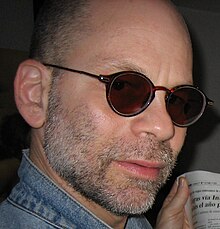Robert Rosen (writer): Difference between revisions
Mr. Paraiso (talk | contribs) Fix quote |
Mr. Paraiso (talk | contribs) Add link to part 3 of interview |
||
| Line 48: | Line 48: | ||
* [http://sites.google.com/site/entrevistasbeatles/entrevista-con-robert-rosen Interview with Robert Rosen in English and Spanish, Part One] |
* [http://sites.google.com/site/entrevistasbeatles/entrevista-con-robert-rosen Interview with Robert Rosen in English and Spanish, Part One] |
||
* [http://sites.google.com/site/entrevistasbeatles/entrevista-con-robert-rosen-part-2 Interview with Robert Rosen in English and Spanish, Part Two] |
* [http://sites.google.com/site/entrevistasbeatles/entrevista-con-robert-rosen-part-2 Interview with Robert Rosen in English and Spanish, Part Two] |
||
* [http://sites.google.com/site/entrevistasbeatles/entrevista-con-robert-rosen/entrevista-con-robert-rosen-part-3 Interview with Robert Rosen in English and Spanish, Part Three] |
|||
* [http://www.john-lennon.com/nowhereman.htm ''Nowhere Man'' excerpt and A Conversation with Robert Rosen from ''Vision Magazine''] |
* [http://www.john-lennon.com/nowhereman.htm ''Nowhere Man'' excerpt and A Conversation with Robert Rosen from ''Vision Magazine''] |
||
* [http://www.courttv.com/archive/trials/ono/092602_ctv.html ''Court TV'' article on Robert Rosen] |
* [http://www.courttv.com/archive/trials/ono/092602_ctv.html ''Court TV'' article on Robert Rosen] |
||
Revision as of 16:57, 30 April 2009
Robert Rosen | |
|---|---|
 Robert Rosen, Mexico City, October 9, 2005 | |
| Occupation | Writer, journalist, editor |
| Alma mater | City College of New York |
| Notable works | Nowhere Man: The Final Days of John Lennon (2000) |
| Spouse | Mary Lyn Maiscott |
Robert Rosen is an American writer born in Brooklyn, New York, on July 27, 1952. He is the author of Nowhere Man: The Final Days of John Lennon, a controversial account of the ex-Beatle’s last five years based on Rosen’s memory of Lennon’s diaries, which he says he used as “a roadmap to the truth.”
Lennon’s diaries were given to Rosen in 1981 by Frederic Seaman, Lennon’s personal assistant. According to Nowhere Man, Seaman told Rosen that Lennon had given him permission to use the diaries as source material for a biography that Seaman was to write in the event of Lennon’s death. Five days after Lennon’s murder, Seaman recruited Rosen to help him with the project.
The manuscript for Nowhere Man, originally written in 1982, was not published for 18 years. The book became a bestseller in the United States, England, Japan, Mexico, and Colombia.
Rosen attended Erasmus Hall High School and studied writing at the City College of New York with Joseph Heller, James Toback, and Francine du Plessix Gray, and edited Observation Post (OP), one of the student newspapers.
Observation Post and The Nun
During Rosen’s tenure as editor, New York Senator James L. Buckley called for a federal investigation of OP when, according to the New York Times of March 10, 1974, the paper ran a cartoon of a nun “using a cross as a sexual object.” Also in response to the cartoon, a State Senator, John Marchi, called for a ban on the use of student activity fees to fund undergraduate newspapers. But the controversy ended on April 17, 1974 when a New York Times editorial defended OP, saying that the Marchi bill was not a “constructive way to inspire faith in civil liberties, or to improve the responsibility or the taste of student editors.”
In 1979, an OP editor posed for a series of photographs that recreated the nun cartoon, and published them in OP. According to the May 24-30, 1979 issue of The Soho Weekly News, these photographs prompted the City University chancellor to publicly apologize to Cardinal Cooke; the Board of Higher Education to demand the criminal prosecution of OP’s editors on obscenity charges; and the student body of City College to vote to eliminate OP’s funding, and end the paper’s 32-year run.
In a piece titled “Nun the Worse for Wear” that ran in the same issue of The Soho Weekly News, Rosen, in one of his first experiments with participatory journalism, told the story of the nun from his own point of view: as the editor who originally published the cartoon, and as the domestic partner of the editor who posed for the photographs.
Men’s Magazines and Beaver Street
Before publishing Nowhere Man Rosen worked as a freelance journalist and a men’s magazine editor at High Society and Swank Publications whose owner, Charles “Chip” Goodman, was the son of Martin Goodman. According to “A Demimonde in Twilight,” which ran in the New York Times on June 2, 2002, Swank Publications emerged from “the same pulp publishing outfit—Martin Goodman's Magazine Management Company—that in 1939 started the comic book publisher that eventually became Marvel Comics, and that in the 1950’s and 1960’s employed future novelists like Mario Puzo and Bruce Jay Friedman as writers and editors.”
This history, as well as another experiment in participatory journalism—posing for an X-rated photo shoot—is at the core of Beaver Street, Rosen’s manuscript about modern pornography which, he says, began at High Society in 1982 with the advent of “free” phone sex, the first fusion of erotica and computers. According to Rosen, Beaver Street explores the hidden nexus where cutting-edge technology meets raw sex, generating vast fortunes for the largely anonymous men who run America’s “adult entertainment” empires.
“It took me 18 years to find a publisher for Nowhere Man,” Rosen has said. “I’m hopeful it will take somewhat less time to find one for Beaver Street.”
Rosen’s erotica was often written under the pen name “Bobby Paradise.” He was briefly a speechwriter for Air Force Secretary John L. McLucas. His work has appeared in Uncut, Mother Jones, La Repubblica, Proceso, Reforma, VSD, and El Heraldo [1].
External links
- Interview with Robert Rosen
- Interview with Robert Rosen in English and Spanish, Part One
- Interview with Robert Rosen in English and Spanish, Part Two
- Interview with Robert Rosen in English and Spanish, Part Three
- Nowhere Man excerpt and A Conversation with Robert Rosen from Vision Magazine
- Court TV article on Robert Rosen
- Nowhere Man's Chapter 27 with additional background information, notes, and links
